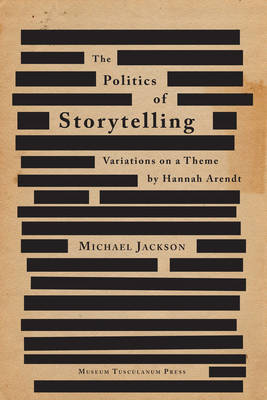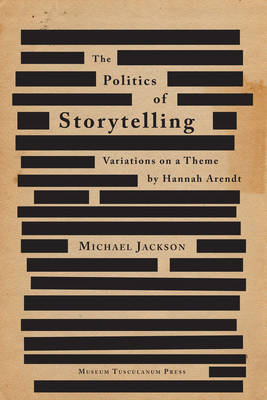
- Afhalen na 1 uur in een winkel met voorraad
- Gratis thuislevering in België vanaf € 30
- Ruim aanbod met 7 miljoen producten
- Afhalen na 1 uur in een winkel met voorraad
- Gratis thuislevering in België vanaf € 30
- Ruim aanbod met 7 miljoen producten
Zoeken
€ 46,45
+ 92 punten
Omschrijving
Hannah Arendt famously argued that politics are best understood as a power relationship between private and public realms. And storytelling, she argued, creates a vital bridge between these realms, a place where individual passions and shared perspectives can be contested and interwoven. In The Politics of Storytelling--revised in this 2nd edition with a new preface and design--anthropologist Michael Jackson explores and expands on Arendt's notions, bringing stories from all around the world into impressive cross-cultural analysis.
Jackson retells stories from the Kuranko in Sierra Leone, the Australian Aboriginals, and the South African Truth and Reconciliation Commission--by refugees, renegades, and war veterans. Focusing on the violent and volatile conditions under which stories are told--or silenced--he explores the power of narrative to remake reality, enabling people to symbolically alter their relations and help reclaim an existential viability. Above all, he shows how Arendt's writings on narrative deepen our understanding of the critical, therapeutic, and politic role of storytelling, that it is one of the crucial ways by which we understand one another.
Jackson retells stories from the Kuranko in Sierra Leone, the Australian Aboriginals, and the South African Truth and Reconciliation Commission--by refugees, renegades, and war veterans. Focusing on the violent and volatile conditions under which stories are told--or silenced--he explores the power of narrative to remake reality, enabling people to symbolically alter their relations and help reclaim an existential viability. Above all, he shows how Arendt's writings on narrative deepen our understanding of the critical, therapeutic, and politic role of storytelling, that it is one of the crucial ways by which we understand one another.
Specificaties
Betrokkenen
- Auteur(s):
- Uitgeverij:
Inhoud
- Aantal bladzijden:
- 312
- Taal:
- Engels
- Reeks:
- Reeksnummer:
- nr. 3
Eigenschappen
- Productcode (EAN):
- 9788763540360
- Verschijningsdatum:
- 15/02/2014
- Uitvoering:
- Paperback
- Formaat:
- Trade paperback (VS)
- Afmetingen:
- 150 mm x 226 mm
- Gewicht:
- 566 g

Alleen bij Standaard Boekhandel
+ 92 punten op je klantenkaart van Standaard Boekhandel
Beoordelingen
We publiceren alleen reviews die voldoen aan de voorwaarden voor reviews. Bekijk onze voorwaarden voor reviews.











